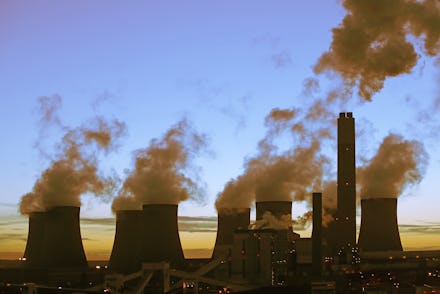3 Americans produce enough carbon emissions in their lifetimes to kill someone

There is a classic psychology thought experiment known as the trolley problem. The premise is this: there is a runaway train that is speeding toward five people down the track. On a different track is just one person. You have the ability to intervene, diverting the vehicle and sparing the group of five at the expense of the other person's life. At the heart of the premise is the question of active participation. Is it worse to intervene and kill one person because you are actively choosing to end that person's life than it is to passively allow the train to continue down the tracks and kill more people, an outcome that would happen whether you were standing there or not?
So, here's a bit of a bummer: As Americans, we're basically living this dilemma every single day and choosing the passive option. With our continued reliance on fossil fuels and greenhouse gas-emitting activities, we are passively killing others across the planet. In fact, according to a new study published Thursday in the scientific journal Nature Communications, the lifestyle of three average Americans creates nearly enough carbon emissions to kill one person.
Here's how the math breaks down: The researchers behind the study created a metric called the mortality cost of carbon (MCC), which estimates the number of deaths that will be caused by each additional metric ton of CO2 that is emitted into the atmosphere. Using the rate of emissions recorded in 2020 as a baseline, they found that every additional 4,434 metric tons of carbon that is emitted into the atmosphere will result in one person globally prematurely dying. That is about the equivalent to the lifetime emissions of 3.5 average Americans. So by simply choosing to live our lives as is without any attempt to reduce our overall footprint, we will contribute to the death of others.
This is not simply an American problem, of course — nor is it really the fault of individuals. While America is the second-largest carbon emitter in the world behind China, engaging in carbon emitting activities is the default because of corporations that have continued to protect their profits and interests rather than the planet. To wit, researchers found that a single year's worth of carbon emissions from the average coal-fired powerplant in the U.S. will ultimately be responsible for the deaths of 904 people by 2100. It'd take the entire lifetime of 3,164 Americans to do the same amount of damage that a single coalplant can do in just one year.
Most Americans are locked into their energy provider because of "natural monopolies" that allow a single provider to dominate a geographic region for the sake of convenience and simplicity. So if your house is powered by a coal plant, you're stuck burning coal to keep the lights on whether you want to or not. Similarly, oil companies have fought tooth and nail to make it harder for electric cars to find their way onto American roads, despite the fact that those vehicles would greatly reduce the country's largest single source of greenhouse gas emissions. This, in large part, is why Americans have such a sizable and deadly emissions footprint. Remember, just 100 corporations are responsible for 71 percent of all global emissions.
This brings us back to the passive versus the active choice — the climate trolley problem. Continuing on the path that we're on, the passive one, will result in significantly more death and destruction. According to the study, researchers estimated that 83 million people will die prematurely as a result of rising global temperatures caused by human-generated emissions if we continue on the path that we are currently on. By taking the threat of climate change seriously, greatly reducing our reliance on fossil fuels, and achieving the goals of the Paris Climate Agreement by reaching net-zero emissions by 2050, we can prevent those deaths. According to the study, getting on this track would save an estimated 74 million lives. Nine million will still die prematurely due to temperature rises associated with climate change, but tens of millions will be saved.
We are standing on the platform and the train is barreling down the track. It's time to pull the lever.